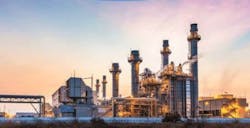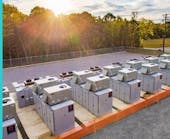Denbury gains CCS rights for proposed Hydrogen-Ammonia complex in Louisiana
A couple of companies focused on decarbonization in the energy sector will work together to develop a hydrogen-ammonia production facility in Louisiana.
Project developer Clean Hydrogen Works will join with energy company Denbury’s Carbon Solutions subsidiary on the planned project in Ascension Parish. Denbury Carbon Solutions will transport and sequester carbon dioxide captured from the complex.
The proposed complex, dubbed Ascension Clean Energy (ACE), will include two world-scale ammonia blocks and will be built on a 1,700-acre site on the west bank of the Mississippi River in Donaldsonville – a location considered ideal to facilitate exports, the companies say.
Estimated production capacity of the two ammonia blocks is 7.2 million metric tons (mmtpa) of ammonia per year, with each block to release an estimated 6 million metric tons of CO2 per year that can be captured and sequestered. The blocks will be commissioned in phases, with Block 1 production expected to commence in 2027.
“We are excited to work with Clean Hydrogen Works and the State of Louisiana on this important clean energy project that aligns with our mission to sustainably deliver energy that the world needs,” said Chris Kendall, Denbury President and CEO. “Our existing CO2 pipeline infrastructure along the Gulf Coast, part of the largest owned and operated CO2 network in the United States, is perfectly situated to handle the CO2 emissions from this massive project and to ensure that the carbon captured is safely transported and secured in underground storage.”
Under the color definitions of hydrogen and ammonia production, this could be classified as “blue,” defined as when H2 is created by carbon-intensive steam reforming of methane gas, but the CO2 emitted is captured and stored. Green hydrogen is when H2 is created by electrolysis powered by renewable or other zero-carbon generation such as nuclear.
Hydrogen does not contain a carbon molecule, so many clean energy advocates are investing in its potential as a future, energy dense resource for both power plants and fuel cell transportation fleets. Ammonia is considered a higher energy density element and be a carrier for hydrogen.
As part of its definitive agreement, Denbury has invested $10 million in the ACE project through an investment in Clean Hydrogen and has committed to invest another $10 million upon attainment of certain project milestones.
It will also have the exclusive right to transport and sequester all the CO2 captured at ACE for a period of 12 years, with multiple extension options.
The agreement also includes permanent, secure underground CO2 storage at one or more of Denbury’s sequestration sites located near Denbury’s existing CO2 pipeline network.
This contract will take Denbury’s aggregate volume of CO2 transportation and storage to 20 mmtpa per year – double the company’s cumulative goal of reaching 10 mmtpa by the end of 2022.





